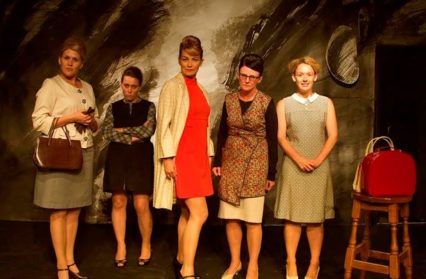Elin Williams is in Pontardawe to review The Revlon Girl a play written by Neil Anthony Docking and starring Charlotte Gray and Terri Dwyer.
First performed in London in June 2015, Neil Anthony Docking’s original piece The Revlon Girl is already enjoying success here in Wales. It began its tour in Pontardawe, where it proved so popular, they put on an extra performance to meet the demand. Set eight months after the Aberfan disaster, the play’s tour will coincide with the 50th anniversary of the event. It will be performed at Blackwood Miner’s Institute on the 21st of October, exactly 50 years to the day when a catastrophic colliery slip resulted in Pantglas Junior School becoming engulfed by slurry, suffocating 116 pupils and 28 adults.
Many Welsh people will no doubt be aware of this horrific incident; many art forms have already paid tribute to the individuals who tragically lost their lives and the relatives who lost loved ones. In 2012, the Mark Jermin School staged a performance which had to be cancelled due to sensitivity and non-consultation issues. Staging a production commemorating the Aberfan disaster is undoubtedly a huge undertaking. It comes with great responsibility and can offer great insight into the repercussions of this tragedy.
Walking out onto the stage on the final evening at Pontardawe Arts Centre, Docking addresses the crowd warmly, informing us of the play’s origin, its importance and some changes to the casting for that evening. Immediately the audience are invested. His obvious sensitivity and passion for the project put the minds of those of us who were unlucky enough to witness the Jermin production at ease. Docking assures us that the drip falling from the ceiling is all part of the play, before sound effects of rain begins to drum softly through the space. This sets the scene appropriately, referencing the incessant rain the week before the slip.
Sian (Charlotte Gray) enters, frantically setting up for what we assume is some sort of meeting in a village hall type space. She gets a bucket for the leak in the ceiling before the Revlon Girl (Terri Dwyer) arrives, glamorous and the polar opposite to Aberfan mother Sian, drab and dull in her attire. We learn that the Revlon Girl has been asked to come and do a make-up presentation for the women of Aberfan eight months after the accident. Something to take their minds off the never-ending grief for a few meagre hours perhaps. Something which could potentially make them feel human again. Paranoid about the Revlon Girl’s posh car, Sian concludes that she will merely lie that she is from the WI, ashamed that people will consider the make up tutorial frivolous, when really it is much more than that. Mothers of the town begin arriving: grief stricken Maralyn (Michelle McTernan) has turned to mediums, whilst crass Rona (Bethan Thomas) is hiding behind her loud mouth.
What follows is a succession of poignant monologues and light hearted reminiscences. Each character obviously has a story to tell, and whilst this may be well delivered by each actress, the structure is all very predictable. The writing is skillful and coupled with expert delivery, it encapsulates the poignancy and loss of those mothers who said goodbye to their children one morning and never saw them again. Despite this, however, the play doesn’t deliver much more than that. It is funny at times, and emotional, but the predictable movement from monologue to dialogue until each character has revealed their inner most hurt becomes repetitive and stale. Perhaps it would have been interesting to consider the perspectives of the husbands, siblings and other peripheral figures. This could have added another dimension to play. There was also use of a choir very briefly at the end of the piece. This musical element felt token and could certainly have been developed further.
It is a great responsibility to commemorate a disaster which is seared into the Welsh consciousness forever, a responsibility which Neil Anthony Docking handles with the utmost sensitivity and tact. It is not a revolutionary piece. It doesn’t raise any new questions or plunge us any further into the darkness of such a traumatic occurrence. It is a piece which is respectful and the subject matter is one which will always draw a Welsh crowd.
To find out more about upcoming events at the Pontardawe Arts Centre visit their website.
Elin Williams has written a number of reviews for Wales Arts Review.












